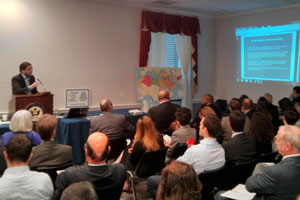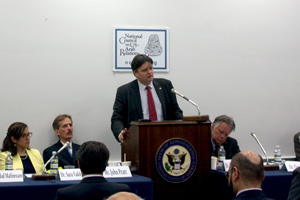NATIONAL COUNCIL ON U.S.-ARAB RELATIONS WELCOMES DR. NAWAF OBAID AS DISTINGUISHED INTERNATIONAL AFFAIRS FELLOW AND MEMBER OF ITS INTERNATIONAL ADVISORY COMMITTEE
Obaid Joins Collective of National Council Scholars and Advisors Contributing Analysis as well as Guiding U.S.-Arab Relations Educational Programs
Washington, DC: The National Council on U.S.-Arab Relations [ncusar.org], founded in 1983, is pleased to announce that Dr. Nawaf Obaid has been named a Distinguished International Affairs Fellow and also a member of the Council’s International Advisory Committee. While the Council’s International Advisory Committee does not formally govern the organization, its members make suggestions, recommendations, assist with the Council’s development objectives, and provide strategic support to the Council’s board of directors together with its president and chief executive officer.
In announcing the appointments, National Council Founding President and CEO Dr. John Duke Anthony said, “We are delighted to welcome Dr. Obaid to these two important positions within the Council. His insightful scholarship on Saudi Arabia’s strategic and geopolitical challenges and opportunities is vital to understanding the kingdom’s growing role in regional and world affairs. Dr. Obaid will be a valuable resource and advisor as we work to strengthen and expand the Council’s U.S.-Arab relations leadership development and bridge-building educational efforts.”
On May 22, 2015, Dr. Obaid delivered a presentation titled “Saudi Arabia Ascendant” at a National Council Congressional and public affairs briefing on Capitol Hill in Washington, DC. The event, held in the Rayburn House Office Building, focused on “Leadership Changes in Saudi Arabia: What Implications for the Kingdom, the Region, and the U.S.?” Slides from Dr. Obaid’s presentation are available on the Council’s website: ncusar.org.
Dr. Obaid has been a Visiting Fellow at Harvard University’s Belfer Center for Science and International Affairs since September 2012. He is also an Associate Instructor for the Harvard Study Group on the Rehabilitation of the Syrian Refugees and for the Winter Field Study Course in the Middle East. Additionally, Dr. Obaid is a Lecturer at the London Academy of Diplomacy at Stirling University and a Senior Fellow at the King Faisal Center for Research and Islamic Studies. Further, he serves as the CEO of the Essam and Dalal Obaid Foundation.
From 2004 to 2007, Dr. Obaid was Special Advisor for Strategic Communications to HRH Prince Turki Al Faisal, while Prince Turki served as the Saudi Arabian Ambassador to the United Kingdom & Ireland, and then to the United States. From 2007 to 2011, Dr. Obaid worked with the Saudi Royal Court. Most recently, he served as Special Counselor to Prince Mohammed bin Nawaf, Saudi Arabian Ambassador to the United Kingdom from 2011 to 2014.
About the National Council on U.S.-Arab Relations: Founded in 1983 and based in Washington, DC, the National Council is an American non-profit, non-governmental, educational organization dedicated to improving American knowledge and understanding of the Arab world. Information about the Council’s program, projects, events, and activities can be found at ncusar.org.



 On May 12, 2015, the
On May 12, 2015, the 
You must be logged in to post a comment.